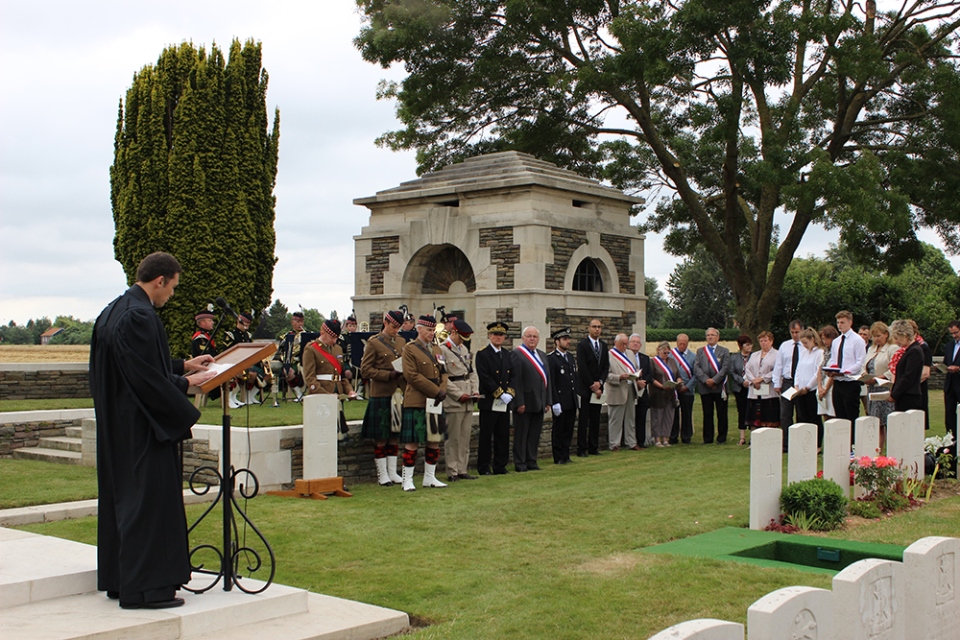Elsewhere I have written about Wilfred Willett and how his wife rescued him when he was left for near-dead in a Base Hospital in Boulogne. He had been injured on 13 December 1914 when crawling out into no-mans land to assist one of his men who had been shot.
I now read of an incident involving his brother Lewis Willett. It caught my eye because my mother was adopted by a Willett and was consequently a cousin once removed of Wilfred and Lewis.
In July 2016 the UK Veterans agency website reported on the burial on 27th July 2016 of Lance Corporal (LCpl) John Morrison, 1st Battalion The Black Watch (Royal Highland Regiment) at Woburn Abbey Cemetery, Cuinchy, France.

Rev Stewart Mackay conducts the service (Crown Copyright) All rights reserved – republished under Open Government Licence
He had been killed in action on 25 January 1915. His remains “were discovered at Cuinchy, near Arras, on 9 December 2014 by a local farmer working in his field. Insignia discovered with the remains included a spoon engraved with his service number 5181.”¹
It was the report of the letters to the family that caught my eye.
Following his death, his parents received a letter from one of John’s comrades describing his last moments:
The attack was fierce and John got a bullet in the leg. Nevertheless, he crawled to the assistance of his officer, also wounded, and was in the act of helping him to remove his pack when he was fatally shot. He was promoted Lance Corporal only a few days before.
The officer concerned, 2nd Lieutenant Lewis Willett, elaborated further on the circumstances of John’s death in a separate letter to John’s brother:
Some gallant fellow crawled up to me shortly after I was hit, and attempted to assist me off with my pack, but owing to the nature of my wound, I was unable to turn my neck sufficiently around to see who it was. I heard he was hit, and asked him if it was so. He replied: “Yes Sir”; and when I inquired later, I received no reply, but could just touch his hand by reaching back, and found he was dead. From the sound of his voice I thought it was your brother, who was in my Platoon, and I hoped it wasn’t so, and that I had made a mistake, for he was one of my most valued men.
His end was a gallant one, and his was a peaceful conclusion to a career, which, had he been spared to prolong it, he could have looked back on with the justifiable pride of one who has done his work well.¹
It was the officer’s name that brought me up short. Wilfred’s brother was a Lewis Howard Willett. Was this officer Wilfred’s brother?
- 2nd Lieutenant Wilfred Willett was injured in December 1914, after going to the assistance of one of his men, Sergeant Moore,
- Lance Corporal John Morrison was killed in January 1915, after going to the assistance of his officer, 2nd Lieutenant Lewis Willett.
Marjorie Seldon, in her biography of her parents Wilfred and Eileen, writes:
Uncle Lewis was my father’s youngest brother. He was less clever than my father and had not wanted to go to university. In the Black Watch Regiment during the War, he had escaped with only a minor wound …²
The Black Watch reference confirms that the injured officer was indeed Wilfred’s brother.
A remarkable but tragic coincidence. If Lewis Willett was not aware of the coincidence at the time, he must at a later point have reflected on the contrast between his story and his brother’s, and how his unfortunate brother was luckier than the brave John Morrison.
¹Ministry of Defence and Veterans UK, World War 1 Black Watch hero finally laid to rest, 27 July 2016, https://www.gov.uk/government/news/world-war-1-black-watch-hero-finally-laid-to-rest [accessed 20 November 2017],
² Seldon Marjorie, Poppies and Roses, a story of courage, 1985, Economic and Literary Books. (p88)
